Die Highlights der Aktuellen Forschung des Centers für Inter-Amerikanische Studien
CAMPS Conference
Camps, Carceral Imaginaries, and Critical Interventions: The 2nd Graz/Puerto Rico International Conference on Human Rights from an Inter-American Perspective
The 2022 conference Camps, (In)justices, and Solidarity in the Americas at the University of Graz (Austria) made it apparent that there is an urge to continue the discussions on human rights and detentions in the Americas and beyond. Hence, it is the aim of this second conference to investigate and critically discuss matters of camps, carceral imaginaries, and other enclosures within an academic setting. The Center for Inter-American Studies (C.IAS) of the University of Graz will hold again this conference together with the Department of English at the University of Puerto Rico’s Río Piedras Campus from May 30th to June 2nd at the University of Graz.
This conference is sponsored by the University of Graz and the University of Puerto Rico, Río Piedras Campus
Keynotes and Special Speakers
Mansoor Adayfi is a writer, advocate, and former Guantánamo Bay prisoner. He spent nearly fifteen years without charge in U.S. custody, including eight years in solitary confinement. Originally from Yemen, he was released to Serbia in 2016. Since then, he has focused on continuing his education and on writing about his experiences. Adayfi’s writings have been published in The New York Times. These include “In Our Prison on the Sea” and “Taking Marriage Class at Guantánamo Bay.” He is also author of the essay “Did We Survive Torture?,” which is included in the edited volume Witnessing Torture; Perspectives of Torture Survivors and Human Rights Workers (2018). Hachette Books is the publisher of his 2021 memoir, Don’t Forget Us Here .
Moazzam Begg is a British-born Muslim, he is a former Guantanamo Bay detainee and Outreach Director for CAGE. After his release, he became one of the most prominent public-speakers and Muslim advocates for justice and dialogue. He is the author of the best-seller Enemy Combatant in which he recounts his experience as an innocent man detained and tortured at Guantanamo, Bagram and Kandahar. The Muslim 500 listed him as one of the 500 “most influential Muslims” in the world. The New Statesman’s listed him in the top 50 “Heroes of our time”. He has travelled extensively to investigate state abuses and western complicity in torture including to Tunisia, Libya, and Syria. A direct eye-witness to the conflicts in Bosnia, Afghanistan and Syria, his life has been recorded by the Columbia University Oral History Project, and the BBC Storyville documentary The Confession.
Behrouz Boochani is an award-winning Kurdish-Iranian writer, journalist, scholar, cultural advocate and filmmaker. He currently serves as an Associate Professor in Social Sciences at UNSW and is a non-resident Visiting Scholar at the Sydney Asia Pacific Migration Centre (SAPMiC) at the University of Sydney. Boochani is an Honorary Member of PEN International and has received numerous awards for his contributions to journalism, including the Amnesty International Australia 2017 Media Award, the Diaspora Symposium Social Justice Award, and the Anna Politkovskaya award. His memoir No Friend But the Mountains (Pan Macmillan 2018, trans. Omid Tofighian) was written during his seven years of incarceration by the Australian government in Papua New Guinea’s Manus Island prison. His new book, Freedom, Only Freedom, was published by Bloomsbury in November 2022.
Mohamedou Houbeini is a writer, advocate, and former prisoner from Mauritania. He was detained at the U.S. government’s Guantánamo Bay prison without charge for approximately fourteen years. Houbeini wrote a memoir during his incarceration, which the U.S. government declassified in 2012 with numerous redactions. An international bestseller and the first memoir to be published during the author’s detention at the Guantánamo Bay naval base, was published as Guantánamo Diary in January 2015. The memoir was used as the basis for a film starring Tahar Rahim, Benedict Cumberbatch, and Jodie Foster. Titled The Mauritanian, it was released in February 2021. Slahi wrote four other books in detention, one of which he describes as being “about finding happiness in a hopeless place.” In 2021, his novel The Actual True Story of Ahmed & Zarga was published by Ohio University Press in its Modern African Writers series. At the time of this writing, Houbeini is a writer-in-residence at Noord Nederlands Toneel, a Dutch theatre company. His main publications have been published under the name Mohamedou Ould Slahi.
Writer, educator and organizer, Erica R. Meiners’ current books include For the Children? Protecting Innocence in a Carceral State (University of Minnesota 2016), a co-edited anthology The Long Term: Resisting Life Sentences, Working Towards Freedom (Haymarket Press 2018); the co-authored Feminist and the Sex Offender: Confronting Sexual Harm, Ending State Violence (Verso 2020); and the co-authored Abolition. Feminism. Now. (Haymarket 2022). Meiners collaboratively started and works alongside others in a range of ongoing mobilizations for liberation, particularly movements that involve access to free public education for all, including people during and after incarceration, and other queer abolitionist struggles. A member of Critical Resistance, the Illinois Death in Custody Project, the Prison+Neighborhood Arts / Education Project, and the Education for Liberation Network, Erica is a sci-fi fan, an avid runner, and a lover of bees and cats.
Alexandra S. Moore is Professor of English and Director of the Human Rights Institute and Kaschak Institute for Social Justice for Women and Girls at Binghamton University. Her most recent publications include the monograph, Vulnerability and Security in Human Rights Literature and Visual Culture (2015) and several edited collections, including Writing Beyond the State: Post-Sovereign Approaches to Human Rights to Literature and Culture (with Samantha Pinto, 2020), Witnessing Torture: Perspectives of Survivors and Human Rights Workers (with Elizabeth Swanson, 2018), and The Routledge Companion to Literature and Human Rights (with Sophia A. McClennen, 2015). She publishes widely on representations of human rights violations in contemporary literature and film. Her current research is on the cultural afterlives of the rendition, detention, and interrogation program in the war on terror.
Abdellatif Nasser was born and raised in Casablanca City, Morocco. After graduating from high school in mathematical science, he studied at the University of Science. For nearly twenty years, between 2002 and 2021, he was detained at the U.S. detention facilities at Guantanamo Bay, Cuba. He was never charged with a crime or tried, but like many others, he was repeatedly interrogated, tortured, and force-fed. He turned to hunger strikes because they were the only means by which he could resist soldiers’ harassment and arbitrary detention. He emerged as a block leader and for years pushed for educational opportunities for his fellow detainees. This led to his nickname, “the Minister of Education.” His story was widely covered in the New York Times, the Guardian, and in the 6-part NPR series “The Other Latif.” As noted in some of these reports, during his incarceration he created a handwritten bilingual (Arabic-English) dictionary that consisted of about 2,000 entries. In the two and a half years since his release, he has studied independently and completed different online courses in a variety of subjects.
María José Rubin is an editor and doctoral candidate in Literature at the University of Buenos Aires. For over ten years she has worked as an educator at the Prison Extension Program—Programa de Extensión en Cárceles, School of Philosophy and Letters, University of Buenos Aires, in Argentina. As part of this program, she coordinates the Editing Collective Workshop, a course that produces several publications dedicated to circulate the writing of incarcerated students. She is a member of the Prison Writing National Meeting organization committee and develops academic research on prison writing, publication, and education. She has published papers on these topics, and is co-author of Escribir en la cárcel. Prácticas y experiencias de lectura y escritura en contextos de encierro, a book on reading and writing practices in prison. As part of the Prison Extension Program activities, she works at a project called “La Segunda,” which provides educational guidance to students who were formerly incarcerated.
Barhoumi Sufyian is from Algeria. He was held in extrajudicial detention at the US naval base in Guantánamo Bay, Cuba for almost twenty years. There he earned a reputation for his good humor, his empathy for those who suffered, and the strong command of English that he acquired during his incarceration. His repatriation from Guantánamo Bay was arranged during the Obama administration but then delayed for about five years. He was reunited with his family in 2022 and is working hard to rebuild his life; he is committed to living a life based on honesty, kindness, and forgiveness. However, the stigma associated with his incarceration is difficult to overcome, and his subjection to various forms of suffering that were induced by his incarceration at Guantánamo is ongoing.
Elliott Young is Professor in the History Department at Lewis and Clark College. Professor Young is the author of Forever Prisoners: How the United States Made the World’s Largest Immigrant Detention System, Alien Nation: Chinese Migration in the Americas from the Coolie Era through WWII, and Catarino Garza’s Revolution on the Texas-Mexico Border, as well as co-editor of Continental Crossroads: Remapping US-Mexico Borderlands History. He is co-founder of the Tepoztlán Institute for Transnational History of the Americas, the Migration Scholar Collaborative (MiSC) and the Migration and Asylum Lab (MAL) at Stanford University. He has also provided expert witness testimony for over 600 asylum cases.
Organizers
Academic Board
Roberta Maierhofer is Professor of American Studies and Director of the Center for Inter-American Studies (C.IAS) at the University of Graz, Austria. From 1999 to 2011, she held a series of Vice-Rector positions for International Relations (1999-2003), International Relations and Affirmative Action for Women (2003-2007), and International Relations and Interdisciplinary Cooperation (2007-2011). In 2000, she initiated and established the focus area South-Eastern Europe at the University of Graz. This expertise of regional and interregional collaboration was fundamental for her leadership role at the Center for Inter-American Studies, which she has been directing since February 2007, and determined how the University of Graz established a second regional focus area in terms of North-, Central- and South America in 2012. She also acts as a co-advisor in terms of the Joint Degree in English and American Studies. Since 2004, she has been directing the Graz International Summer School Seggau, which was established as an interdisciplinary and intercultural platform in the fields of European and Inter-American Studies.
Don E. Walicek is Professor of English and Linguistics at the University of Puerto Rico’s Río Piedras Campus. He earned a BA in Cultural Anthropology and an MA in Latin American Studies at the University of Texas at Austin. He was awarded his PhD in English from the University of Puerto Rico. Much of his research has focus on issues of language, migration, and social life in the Caribbean, in particular Anguilla, Cuba, and the Dominican Republic. His publications include Guantánamo and American Empire: The Humanities Respond (2018) and an issue of the Caribbean Studies journal Sargasso titled,“Guantánamo: What’s Next?,”both of which he co-edited with Jessica Adams. In 2019, he was a Fulbright Scholar at the Karl-Franzens University of Graz and a Fellow of the American Council of Learned Societies. He has acted as editor of the journal Sargasso since 2009.
Nicole Haring is postdoctoral researcher at the Center for Inter-American Studies at the University of Graz, Austria. Her research interests focus on feminist theory, contemporary US-American literature, Inter-American studies, aging and intergenerational studies, and critical pedagogies. She has had a Fulbright fellowship at the University of Oklahoma (2019-2020), the Elisabeth-List-Fellowship for Gender Studies at the University of Graz (2020-2021) and recently finished her DOC Fellowship from the Austrian Academy of Science where she worked on intergenerational storytelling on gender and education (2021-2023). Currently, her research focuses on social reproduction theory, eco-criticism and environmental humanities. She is the lead researcher in the Erasmus+ project “Eco-Storytelling” and has been the academic assistant of the Graz International Summer School Seggau (GUSEGG) since 2022. Additionally, she was the co-organizer of the 2022 Graz camps conference.
Christian Cwik is a historian for Latin American and Caribbean. He graduated from the University of Vienna, where he earned a PhD in history and philosophy with an emphasis on African and Jewish Diaspora, Slave-trade and slavery as well as Shoa-history. Before joining the Center for Inter-American Studies at the University of Graz in 2019 he was lecturer at the University of the West Indies in Trinidad and Tobago, invited professor at the University of Havana, the University of Cartagena de Indias in Colombia and professor for Colonial Ibero-American history at the Bolivarian University of Venezuela in Caracas. Furthermore, he was substitute professor at Cologne and Erfurt University in Germany. About interment and repression during the Shoa and aftermath he has published several books and articles among them Las relaciones bilaterales en perspectiva histórica, 1504-2017 (2019) and Diktaturen im Zeitalter des Kalten Krieges (with Hans-Joachim König and Stefan Rinke 2020).
Bilgin Ayata is a professor for Southeastern European Studies at the Center for Southeastern European Studies at the University of Graz. Her research centers on socio-political transformation processes with a focus on migration, borders, affect and emotions. She is project leader of the NOMIS Research project “Elastic Borders- Rethinking the borders of the 21st Century”. She has published widely on affective politics, displacement, diasporas, citizenship, memory and genocide denial and foreign policy. Her SNF Funded research project on “Affective Citizenship: Religion, Migration and Belonging in Europe” examined the relationship between religious incorporation and belonging. Her SNIS funded project “Infrastructure space and the future of Migration Management” explored the infrastructure of migration control. Ayata is co-speaker of the Cluster “Migration, Borders and Mobility” at the Field of Excellence “Dimensions of Europe” at the University of Graz and has been DFG-Mercator Fellow of the SFB 1171 “Affective Societies” at the FU Berlin (2019-2023).
Laura Jung is a postdoctoral researcher at the University of Graz. She earned a PhD in International Relations from the University of Sussex and holds an MA in Political Science and a BA in History and Sociology. Her research focuses on the interactions of science, technology and medicine with political orders. She is currently a member of the NOMIS-funded research project “Elastic Borders” at the University of Graz, where she is researching the use of advanced technologies in the EUropean border regime. Her thesis research focused on the trauma diagnosis as a means of nation-building in Germany, and she has published on themes of sovereignty, biopolitics, psychiatric diagnosis, welfare, compensation claims, and eugenic politics. She was recently awarded a grant by the Zukunftsfond Styria to research the impact of AI technologies on asylum processing in Austria.
Organizers
International Advisory Committee
Esther Whitfield is Associate Professor of Comparative Literature and Hispanic Studies at Brown University in Providence, Rhode Island, USA. She is author of Cuban Currency: The Dollar and ‘Special Period’ Fiction (University of Minnesota Press, 2008); co-editor with Jacqueline Loss of New Short Fiction from Cuba (2008); and co-editor with Anke Birkenmaier of a collection of essays on post-1989 Havana, Havana Beyond the Ruins (2011). She has published articles on literary writing in post-Soviet Cuba and borders, visibility and surveillance at the Guantánamo naval base. She is currently writing a book, “The New No-Man’s Land: Guantánamo’s Literary Life,” which proposes reading the U.S. naval base at Guantánamo and the surrounding areas of Eastern Cuba as a borderland region that shares a natural environment, a marking of human lives by isolation, and a body of literature and art privileging survival over political hostility.
Maritza Stanchich, Ph.D., is Professor of English at University of Puerto Rico, Río Piedras, where she teaches Puerto Rican diaspora, Latinx, Caribbean, and American literatures. Her essays on William Faulkner, Puerto Rican diaspora literature, and the crisis at University of Puerto Rico, have been published in peer-reviewed journals and books. In 2020, she and co-author Hilda Lloréns won the LASA-Puerto Rico Section Blanca G. Silvestrini Prize for Outstanding Article in Puerto Rican Studies. An award- winning journalist, her columns for The Huffington Post, The New York Times and The Guardian helped bring international attention to Puerto Rico’s crisis starting in 2010. A long-time activist, she has also worked for academic unionization at University of California and with the Asociación Puertorriqueña de Profesores Universitarios (APPU). Raised in New Jersey, of Croatian and Peruvian descent, she has lived and worked in Puerto Rico for nearly 25 years.
Jessica Adams graduated from Bryn Mawr College, where she majored in English, and Tulane University, where she earned a PhD in English with a focus on US literature, Post-Colonial Studies, and Performance. Before joining the English Department in the College of General Studies at the University of Puerto Rico, Río Piedras Campus, she taught at Tulane University, the University of Michigan, the University of California–Berkeley, and the University of the Virgin Islands in St. Thomas. In addition to publishing essays, short stories, and poetry, she is the coeditor, with Don E. Walicek, of Guantánamo and American Empire: The Humanities Respond (2018),and a special issue of the journal Sargasso titled,“Guantánamo: What’s Next?” She is author of Wounds of Returning: Race, Memory, and Property on the Post-Slavery Plantation (2007), and coeditor of Just Below South: Intercultural Performance in the Caribbean and the U.S. South (2007)and Revolutionary Freedoms: A History of Survival, Strength, and Imagination in Haiti (2006), among other works.
Cuban historian, Professor of History of Latin America and Director of the Department of History of the University of Havana, President of the Association of Latin American and Caribbean Historians (ADHILAC) and Full Member of the Academy of History of Cuba and Correspondent of that of Ecuador. Ph. D. in History from the University of Leipzig (Germany). He is director of the doctoral program in History at the University of Havana. Author of more than five hundred articles, essays and books on Latin American history, among them: Paraguay, from independence to imperialist domination (1984), Five centuries of Latin American historiography (2009) and Latin America after independence. From the Capitulation of Ayacucho to the Mexican Revolution (2019). In 2018 he received the National Prize for Social and Humanistic Sciences of the Republic of Cuba.
Organizers
Organizational Committee
Eva Katharina Bauer is currently enrolled in the Joint Master’s Programme for English and American Studies at the University of Graz and the Université Paris Cité. She supports both, the Institute of English Studies and the Center for Inter-American Studies in the capacity of a student assistant. Her academic interests mainly revolve around socio- and psycholinguistics as well as feminist and African American literature. Her current research focuses on the role of temporalities of environmental issues within ecolinguistics. She was part of the local organizing team of the sixth International Conference on Ecolinguistics in Graz and helped as a student assistant at the first Graz/Puerto Rico International Conference on Human Rights from an Inter-American Perspective in 2022. For this year’s conference, Eva will join the organizational committee.
Anamari Slemenšek, a student at the University of Graz, is pursuing her majors in English and American Studies alongside minors in economics, languages, and law. Her academic journey is distinguished by active participation in two international conferences. Ana’s scholarly passions intersect at the junction of intersectionality and feminist literature, as well as human rights violations. Her current research delves into the narratives surrounding war crimes, with a particular emphasis on those perpetrated against women.
Mirna Cobanovic is currently enrolled in the Masters´s Degree in English and American studies at the University of Graz. She is currently employed at the Center for Inter-American Studies as a student assistant, as part of which she was tasked with helping the first CAMPS conference in 2022. As a self-proclaimed “person interested in anything and everything”, she finds no difficulty participating in any discourse, debate or even conversation.
Artiola Kajtazi is a dedicated MA student at the University of Graz, specializing in English and American studies. Alongside her academic commitments, Artiola serves as a student assistant at CIAS Graz. She previously worked as ESL teacher and executive assistant. Beyond her academic and professional endeavors, she is a passionate human rights activist. Her commitment to this cause has led her to collaborate with various local and international non-governmental organizations operating in Kosovo, focusing on raising awareness and supporting women’s rights, including organizing impactful events to address the issue of rape victims from the 1999 war in Kosovo.
CAMPS 2024 - Opening Ceremony
Full recording available under the link
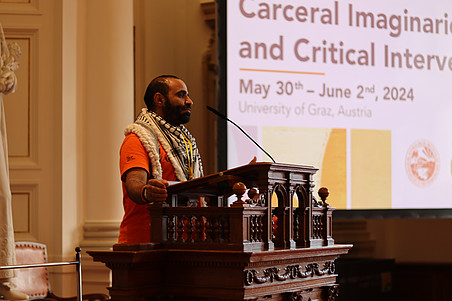
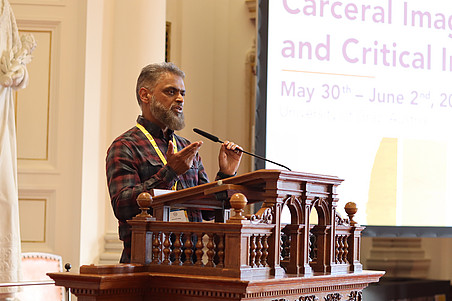
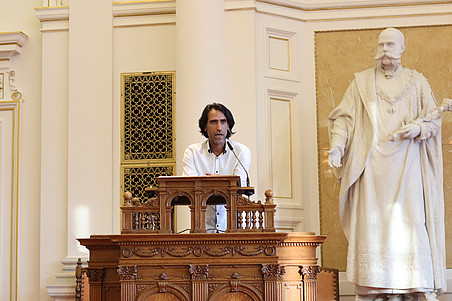
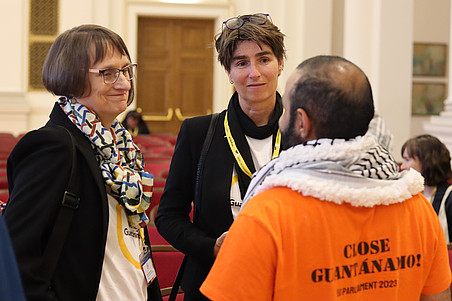
CAMPS - Day 2
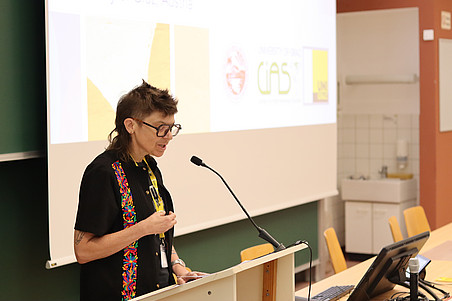
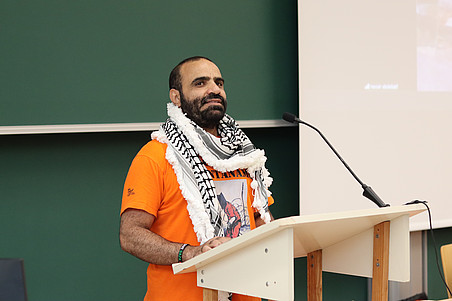
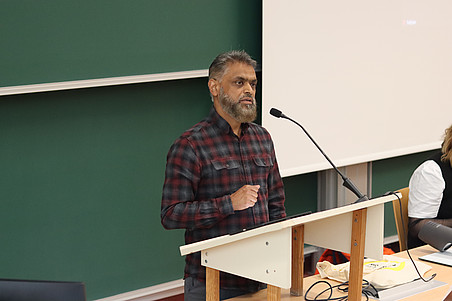
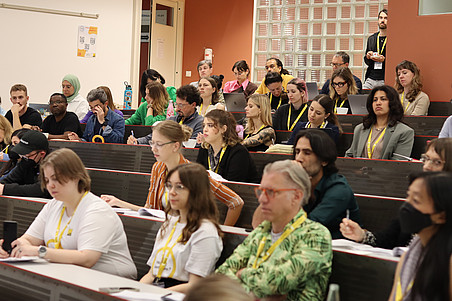
Eco-Storytelling: A Digital Toolbox for the English Classroom for Building a Climate-Just Future
Objectives, Implementation and Results
Objectives:
EcoStories wants to achieve the development of an Eco-Storytelling digital toolbox to support teachers’ implementation of a critical ecological pedagogy in the English Foreign Language classroom that promotes students’ development of climate, digital, and foreign language literacy skills in order to stimulate and cultivate the ability to imagine a greener and climate-just future.
Implementation:
The project will implement Eco-Storytelling activities based on the engagement with and the analysis of literary (climate fiction) and museum resources using the CLIL (Content and Language Integrated Learning) approach connecting formal and non-formal education. Art-based (creative writing) and digital storytelling activities will also be implemented to foster students’ multiliteracy skills in English.
Results:
The project’s main result will be a digital Eco-Storytelling toolbox consisting of a competence framework (static and interactive) on critical ecological pedagogy for the English classroom, teacher training resources for pre- and in-service English teachers and 6 Eco-CLIL units for B1+ English learners, an online training program for Eco-Storytelling as well as three editions of a MOOC course. The outcomes will be the training of over 120 pre- and in-service teachers in Eco- Storytelling.
Our Project
The project addresses the selected priorities by developing an Eco-Storytelling toolbox for the English (ESL/EFL) classroom that aims at stimulating the imagination for building a climate-just and low-carbon future while also fostering teachers’ and students’ digital skills and competences in the English language classroom. The toolbox is targeted at pre- and in-service teachers of English, as well as English learners (level B1+).
Climate change and other kinds of environmental degradation make the questions of sustainability one of the most pressing issues of our current times. An issue that school education has the duty to address by developing new and cross-disciplinary competences that help learners build a climate-just future. For foreign language teachers, in our case English teachers, this means accomplishing the joint task of both “facilitating student enjoyment of and expertise in their languages, and at the same time engaging students in fulfilling their responsibility as citizens of their home country and the world” (Maley 2022, 346).
EcoStories aims at supporting English teachers in doing so by developing a competence framework, educational materials, as well as providing them with digital training, all of which are based on the integration of English, climate, and digital literacies. The toolbox will incorporate digital methodologies in the form of digital storytelling using open source, participatory platforms that promote the creation of stories inspired by students’ engagement with museum resources/sites in combination with climate fiction. Addressing the particular interconnections between digitalization and climate change is central to this project to enable students to better understand the twin transition (digital and green) that the European Union is currently dealing with. Furthermore, the project will build on the competences of Education for Sustainable Development (ESD), which aims at giving “learners of all ages the knowledge, skills, values and agency to address interconnected global challenges, including climate change, loss of biodiversity, unsustainable use of resources, and inequality” (UNESCO 2022).
The pedagogical approaches in ESD aim at enabling a shift towards active, participative, and experimental learning methods to address climate change related issues and digital transformation, which this project will follow in its objectives. ESD is also closely linked to the Sustainable Development Goals (SDGs) and is seen as a key strategy to realize quality education which is essential for reaching the SDGs. The project, hence, addresses the two priorities (climate change and digital transformation) in its design, objectives, and outcomes. Finally, EcoStories also fosters a comprehensive approach to language teaching and learning as a specific priority, as it supports both the use of new technologies for language learning and the development of CLIL teaching skills and educational resources. The project addresses the selected priorities by developing an Eco-Storytelling toolbox for the English (ESL/EFL) classroom that aims at stimulating the imagination for building a climate-just and low-carbon future while also fostering teachers’ and students’ digital skills and competences in the English language classroom. The toolbox is targeted at pre- and in-service teachers of English, as well as English learners (level B1+).
Climate change and other kinds of environmental degradation make the questions of sustainability one of the most pressing issues of our current times. An issue that school education has the duty to address by developing new and cross-disciplinary competences that help learners build a climate-just future. For foreign language teachers, in our case English teachers, this means accomplishing the joint task of both “facilitating student enjoyment of and expertise in their languages, and at the same time engaging students in fulfilling their responsibility as citizens of their home country and the world” (Maley 2022, 346).
EcoStories aims at supporting English teachers in doing so by developing a competence framework, educational materials, as well as providing them with digital training, all of which are based on the integration of English, climate, and digital literacies. The toolbox will incorporate digital methodologies in the form of digital storytelling using open source, participatory platforms that promote the creation of stories inspired by students’ engagement with museum resources/sites in combination with climate fiction. Addressing the particular interconnections between digitalization and climate change is central to this project to enable students to better understand the twin transition (digital and green) that the European Union is currently dealing with. Furthermore, the project will build on the competences of Education for Sustainable Development (ESD), which aims at giving “learners of all ages the knowledge, skills, values and agency to address interconnected global challenges, including climate change, loss of biodiversity, unsustainable use of resources, and inequality” (UNESCO 2022). The pedagogical approaches in ESD aim at enabling a shift towards active, participative, and experimental learning methods to address climate change related issues and digital transformation, which this project will follow in its objectives. ESD is also closely linked to the Sustainable Development Goals (SDGs) and is seen as a key strategy to realize quality education which is essential for reaching the SDGs. The project, hence, addresses the two priorities (climate change and digital transformation) in its design, objectives, and outcomes. Finally, EcoStories also fosters a comprehensive approach to language teaching and learning as a specific priority, as it supports both the use of new technologies for language learning and the development of CLIL teaching skills and educational resources.
BA. M.A. Eva Katharina Bauer
Graz School of Interdisciplinary Transnational Studies
To arrange a meeting, please send me an Email!
https://interamerikanistik.uni-graz.at/en/